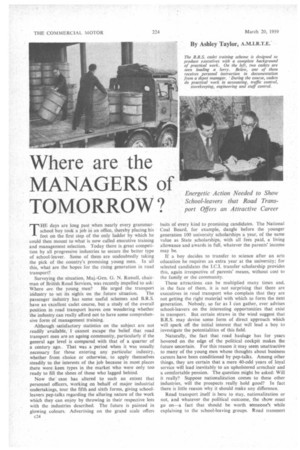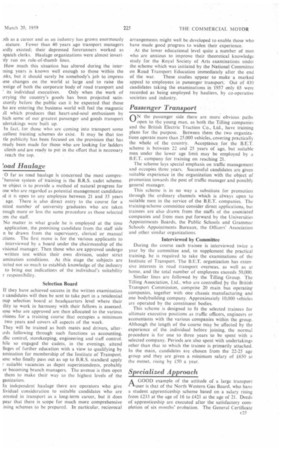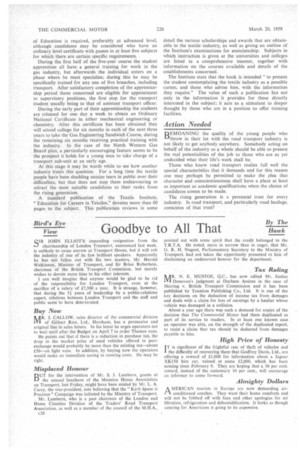Where are the MANAGERS of TOMORROW?
Page 62

Page 63

Page 64

If you've noticed an error in this article please click here to report it so we can fix it.
Energetic Action Needed to Show School-leavers that Road Transport Offers an Attractive Career THE days are long past when nearly every grammarschool boy took a job in an office, thereby placing his feet on the first step of the only ladder by which he could then mount to what is now called executive training and management selection. Today there is great competition by all progressive industries to secure the better type of school-leaver. Some of them are undoubtedly taking the pick of the country's promising young men. In all this, what are the hopes for the rising generation in road transport?
Surveying the situation, Maj.-Gen. G. N. Russell, chairman of British Road Services, was recently impelled to ask: Where are the young men? He urged the transport industry to set its sights on the future situation. The passenger industry has some useful schemes and B.R.S. have an excellent cadet course, but a study of the overall position in road transport leaves one wondering whether the industry can really afford not to have some comprehensive form of management training.
Although satisfactory statistics on the subject are not readily available, I cannot escape the belief that road transport men are an ageing community, particularly if the general age level is compared with that of a quarter of a century ago. That was a period when it was usually necessary for those entering any particular industry, whether from choice or otherwise, to apply themselves steadily to the interests of the job because in most places there were keen types in the market who were only too ready to fill the shoes of those who lagged behind.
Now the case has altered to such an extent that personnel officers, working on behalf of major industrial undertakings, tour the fifth and sixth forms, giving schoolleavers pep-talks regarding the alluring nature of the work which they can enjoy by throwing in their respective lots with the industries described. The future is painted in glowing colours. Advertising on the grand scale offers
c24 baits of every kind to promising candidates. The National Coal Board, for example, dangle before the younger generation 100 university scholarships a year, of the same value as State scholarships, with all fees paid, a living allowance and awards in full, whatever the parents' income may be.
If a boy decides to transfer to science after an arts education he requires an extra year at the university; for selected candidates the I.C.I. transfer scholarship provides this, again irrespective of parents' means, without cost to the family or the community.
These attractions can be multiplied many times and, in the face of them, it is not surprising that there are executives in road transport who complain that they are not getting the right material with which to form the next generation. Nobody, so far as I can gather, ever advises school-leavers on the interesting opportunities that exist in transport. But certain straws in the wind suggest that B.R.S. may devise some form of direct approach which will spark off the initial interest that will lead a boy to investigate the potentialities of this field.
Naturally, the fact that road haulage has for years hovered on the edge of the political cockpit makes the future uncertain. For this reason it may seem unattractive to many of the young men whose thoughts about business careers have been conditioned by pep-talks. Among other things, they are certain that a mere 40-odd years of loyal service will lead inevitably to an upholstered armchair and a comfortable pension. The question might be asked: Will it really? Suppose nationalization comes to these other industries, will the prospects really hold good? In fact there is little reason why it should make any difference.
Road transport itself is here to stay, nationalization or not, and whatever the political outcome, the show must go on—a fact that should be worth someone's while explaining to the school-leaving groups. Road transport ath as a career and as an industry has grown enormously stature. Fewer than 40 years ago transport managers irdly existed; their depressed forerunners worked as spatch clerks. Haulage organizations were almost invari>ly run on rule-of-thumb lines.
How much this situation has altered during the interning years is known well enough to those within the mks, but it should surely be somebody's job to impress Lese changes on the world at large and to raise the -estige of both the corporate body of road transport and
its individual executives. Only when the work of Laying the country's goods has been projected satisctorily before the public can it be expected that those ho are entering the business world will feel the magnetic ill which produces that heart-and-soul enthusiasm by hich some of our greatest passenger and goods transport idertakings were built up.
In fact, for those who are coming into transport some :cellent training schemes do exist. It may be that too tle publicity has been focused on the provision that has ready been made for those who are looking for ladders climb and are ready to put in the effort that is necessary reach the top.
!bad Haulage
0 far as road haulage is concerned the most comprehensive system of training is the B.R.S. cadet scheme. le object is to provide a method of natural progress for ose who are regarded as potential management candidates id it is open to any employee between 21 and 35 years age. There is also direct entry to the course for a nited number of university graduates who are taken rough more or less the same procedure as those selected am the staff.
No matter in what grade he is employed at the time application, the promising candidate from the staff side n be drawn from the supervisory, clerical or manual otions. The first move is for the various applicants to interviewed by a board under the chairmanship of the visional manager. Then those who are approved undergo written test within their own division, under strict amination conditions. At this stage the subjects are !ected not so much to establish knowledge of the industry to bring out indications of the individual's suitability r responsibility.
Selection Board If they have achieved success in the written examination 5 candidates will then be sent to take part in a residential oup selection board at headquarters level where their ility to work in harmony with their fellows is assessed. rose who are approved are then allocated to the various visions for a training course that occupies a minimum two years and covers all aspects of the work.
They will be trained as both mates and drivers, afterirds following through such functions as accounting, Mc control, storekeeping, engineering and staff control. hile so engaged the cadets, in the evenings, attend lieges of further education with a view to qualifying by amination for membership of the Institute of Transport. lose who finally pass out as up to B.R.S. standard apply r suitable vacancies as depot superintendents, probably er becoming branch managers. The avenue is then open them to make their way to the highest levels of the ganizat ion.
In independent haulage there are operators who give iividual consideration to suitable candidates who are .erested in transport as a long-term career, but it does pear that there is scope for much more comprehensive ining schemes to be prepared. In particular, reciprocal
arrangements might well be developed to enable those who have made good progress to widen their experience.
At the lower educational level quite a number of men who are anxious to improve their theoretical knowledge study for the Royal Society of Arts examinations under the scheme which was initiated by the National Committee on Road Transport Education immediately after the end of the war. These studies appear to make a marked appeal to employees in passenger transport. Out of 430 candidates taking the examinations in 1957 only 65 were recorded as being employed by hauliers, by co-operative societies and industry.
Passenger Transport
ON the passenger side there are more obvious paths
open to the young man, as both the Tilling companies and the British Electric Traction Co., Ltd., have training plans for the purpose. Between them the two organizations operate more than 25,000 vehicles, covering practically the whole of the country. Acceptance for the B.E.T. scheme is between 22 and 25 years of age, but suitable men under the lower age limit may be employed by a B.E.T. company for training on reaching 21.
The scheme lays special emphasis on traffic management and occupies three years. Successful candidates are given suitable experience in the organization with the object of promotion towards the post of traffic manager and possibly general manager.
This scheme is in no way a substitute for promotion through the ordinary channels which is always open to suitable men in the service of the B.E.T. companies. The training-scheme committee consider direct applications, but trainees are also drawn from the staffs of the associated companies and from men put forward by the Universities Appointments Boards, the Public Schools and Grammar Schools Appointments Bureaux, the Officers' Association and other similar organizations.
Interviewed by Committee During the course each trainee is interviewed twice a year by the committee and, to supplement the practical training, he is required to take the examinations of the Institute of Transport. The BET. organization has extensive interests in road transport overseas, as well as at home, and the total number of employees exceeds 50,000.
Similar lines are followed by the Tilling Group. The Tilling Association, Ltd., who are controlled )33,/ the British Transport Commission, comprise 20 main bus operatiny companies, together with one chassis manufacturing and one bodybuilding company. Approximately 10,000 vehicles are operated by the constituent bodies.
This scheme is designed to fit the selected trainees for ultimate executive positions as traffic officers, engineers or accountants with the various companies within the group. Although the length of the course mhy be affected by the experience of the individual before joining, the normal procedure is for one to three years to be spent with a selected company. Periods are also spent with undertakings other than that to which the trainee is primarily attached. In the main, candidates are chosen from the 22-25 age group and they are given a minimum salary of £650 at the outset, rising by £50 a year.
Specialized Approach
A GOOD example of the attitude of a large transport Exuser is that of the North Western Gas Board, who have a student apprenticeship scheme based on a salary rising from £233 at the age of 16 to £421 at the age of 21. Deeds of apprenticeship are executed after the satisfactory completion of six months' probation. The General Certificate
of Education is required, preferably at advanced level, although candidates may be considered who have an ordinary level certificate with passes in at least five subjects for which there are certain specific requirements.
During the first half of the five-year course the student apprentices all have a general training for work in the gas industry, but afterwards the individual enters on a phase where he must specialize; during this he may be specifically trained for any one of five branches, including transport. After satisfactory completion of the apprenticeship period those concerned are eligible for appointment to supervisory positions, the first step for the• transport student usually being to that of assistant transport officer.
During the early part of their apprenticeship the students are released for one day a week to obtain an Ordinary National Certificate in either mechanical engineering or chemistry. After this certificate has been obtained they will attend college for six months in each of the next three years to take the Gas Engineering Sandwich Course, during the remaining six months receiving practical training, with the industry. In the case of the North Western Gas Board plan, a particularly encouraging feature seems to be the prospect it holds for a young man to take charge of a transport sub-unit at an early age.
At this stage it may be worth while to see how another industry treats this question. For a long time the textile people have been shedding outsize tears in public over their difficulties, but that does not stop them endeavouring to attract the most suitable candidates to their ranks from the rising generation.
,A standard publication of the Textile Institute, " Education for Careers in Textiles," devotes more than 60 pages to the subject.This publication reviews in some
detail the various scholarships and awards that are obtainable in the textile industry, as well as giving an outline of the Institute's examinations for associateship. Subjects in which instruction is given at the universities and colleges are listed in a comprehensive manner, together with information on the courses available and details of the establishments concerned.
The Institute state that the book is intended " to present the student contemplating the textile industry as a possible career, and those who advise him, with the information they require." The value of such a publication lies not only in the information it provides for those directly interested in the subject; it acts as a stimulant to deeper thought by those who are in a position to offer training facilities.
Action Needed BEMOANING the quality of the young people who -"throw in their lot with the road transport industry is not likely to get anybody anywhere. Somebody acting on behalf of the industry as a whole should be able to present the real potentialities of the job to those who are as yet undecided what their life's work shall be.
Those who know road transport realize full well the special characteristics that it demands and for this reason one may perhaps be permitted to make the plea that character and conscientiousness shall have a place at least as important as academic qualifications when the choice of candidates comes to be made.
The rising generation is a perennial trust for every industry. Is road transport, and particularly road haulage, conscious of that trust?












































































































